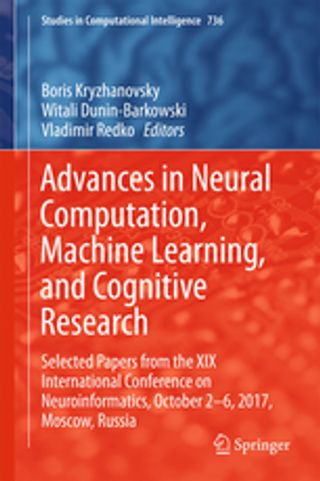?
Emotion Recognition in Sound
P. 117–124.
Ключевые слова: classificationspeech recognitionemotion recognitiondeep learningconvolutional neural networksaudio recognition
ПУБЛИКАЦИЯ ПОДГОТОВЛЕНА ПО РЕЗУЛЬТАТАМ ПРОЕКТА:
Котов Ф. И., Тимохин И. С., Иванов Ф. И., , in: 2023 XVIII International Symposium Problems of Redundancy in Information and Control Systems (REDUNDANCY).: IEEE, 2023.
The Successive Cancellation List (SCL) algorithm is a widely used decoding technique in communication systems. However, constructing the critical set for SCL decoding is a challenging task, as it requires a large number of computations and can lead to significant decoding delays. In this paper, a new approach to critical set construction for SCL decoding ...
Добавлено: 26 января 2026 г.
Настина Е. А., Соколов Б. О., / Series OSF "SocArXiv". 2025.
We argue that a classification-based approach to measuring cultural differences across countries or subnational regions is a promising complement, and sometimes an alternative, to the widely used dimensional method in cross-cultural research. The latter summarises cultural variation using continuous dimensions, for example, Hofstede’s famous individualism-collectivism dimension. However, this approach relies on strong parametric assumptions, which ...
Добавлено: 23 декабря 2025 г.
Пикуль А. С., Безопасность информационных технологий 2024 Т. 31 № 4 С. 116–127
Исследуется возможность применения современных архитектур компьютерного зрения для задачи обнаружения дипфейков. Рассматриваются следующие архитектуры: EfficientNet, Vision Transformer (ViT), VisionLSTM (ViL), VisionKAN и Mamba Vision. Новизна подхода заключается в применении и сравнении работы данных архитектур, а также в их объединении в парные ансамбли для повышения точности детекции дипфейков. В работе проведен эксперимент, основанный на применении нескольких ...
Добавлено: 12 декабря 2025 г.
Seleznev L. E., Chupakhin A. A., Kostenko V. A. и др., Optical Memory and Neural Networks (Information Optics) 2023 Vol. 32 No. 2 P. 73–85
Добавлено: 2 октября 2025 г.
Zabolotniy A., Chan R. W., Моисеева В. В. и др., Frontiers in Neuroscience 2025 Vol. 19 Article 1623380
Добавлено: 2 октября 2025 г.
G-quadruplexes (GQs) are non-canonical DNA structures encoded by G-flipons with potential roles in gene regulation and chromatin structure. Here, we explore the role of G-flipons in tissue specification. We present a deep learning-based framework for the genome-wide G-flipon predictions across 14 human tissue types. The model was trained using high-confidence experimental maps of GQ-forming sequences ...
Добавлено: 8 августа 2025 г.
Шайтан А. К., Science China Information Sciences 2025 Vol. 68 No. 7 Article 170102
Добавлено: 25 июня 2025 г.
Драгалина-Черная Е. Г., В кн.: Четырнадцатые Смирновские чтения по логике: материалы Междунар. науч. конф., Москва, 19-21 июня 2025 г.: М.: Издатель Александр Воробьев, 2025. С. 80–82.
В докладе сопоставляются истолкования абстрактных логик как структур и как классификаций абстрактных структур. ...
Добавлено: 20 июня 2025 г.
Добавлено: 15 июня 2025 г.
Подчуфаров А. Ю., Галкина А. Н., Ванина С. С. и др., Экономика и управление: проблемы, решения 2025 Т. 5 № 4 С. 61–74
В современных условиях внедрение технологий искусственного интеллекта становится значимым фактором развития высокотехнологичных отраслей промышленности. В статье представлены результаты исследования перспектив применения интеллектуальных аналитических систем в атомной энергетике. Проанализирован опыт зарубежных стран и выявлены особенности успешных проектов с использованием искусственного интеллекта в данной области. Обоснованы рекомендации по развитию технических и социальных компетенций в отечественной атомной и ...
Добавлено: 5 июня 2025 г.
Рыжова А. А., Sochenkov I., , in: Proceeding 2019 Ivannikov Ispras Open Conference (ISPRAS).: IEEE Computer Society, 2019. P. 60–67.
Добавлено: 1 мая 2025 г.
Перелыгин В. Р., Kamelin A., Syzrantsev N. и др., Frontiers in Medicine 2025 Vol. 11 Article 1479717
Добавлено: 4 марта 2025 г.
Ivan Rubachev, Nikolay Kartashev, Gorishniy Y. и др., , in: Proceedings of the 13th International Conference on Learning Representations (ICLR 2025).: ICLR, 2025. P. 53831–53867.
Добавлено: 1 марта 2025 г.
W. Joseph MacInnes, Жожикашвили Н. А., Феурра М., , in: First International Conference, AIiH 2024, Swansea, UK, September 4–6, 2024, Proceedings, Part II. Artificial Intelligence in Healthcare. LNCS, volume 14976Vol. 14976.: Springer, 2024. P. 221–234.
Добавлено: 28 января 2025 г.
Yury Gorishniy, Ivan Rubachev, Nikolay Kartashev и др., , in: Proceedings of the 12th International Conference on Learning Representations (ICLR 2024).: ICLR, 2024.
Добавлено: 22 января 2025 г.
Болдырев А. С., Деркач Д. А., Ратников Ф. Д. и др., EPJ Web of Conferences 2024 Vol. 295 Article 09008
Добавлено: 8 января 2025 г.
